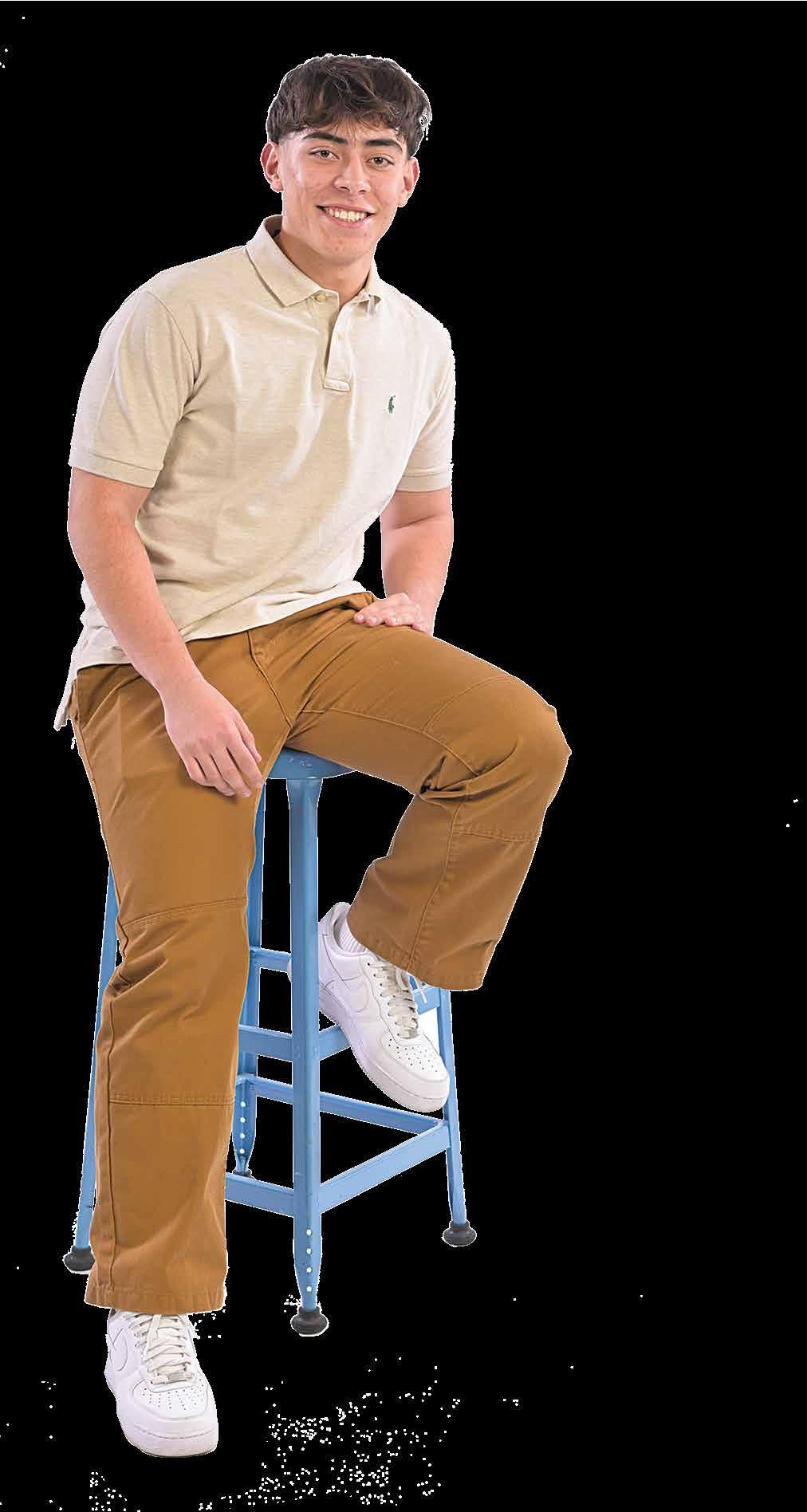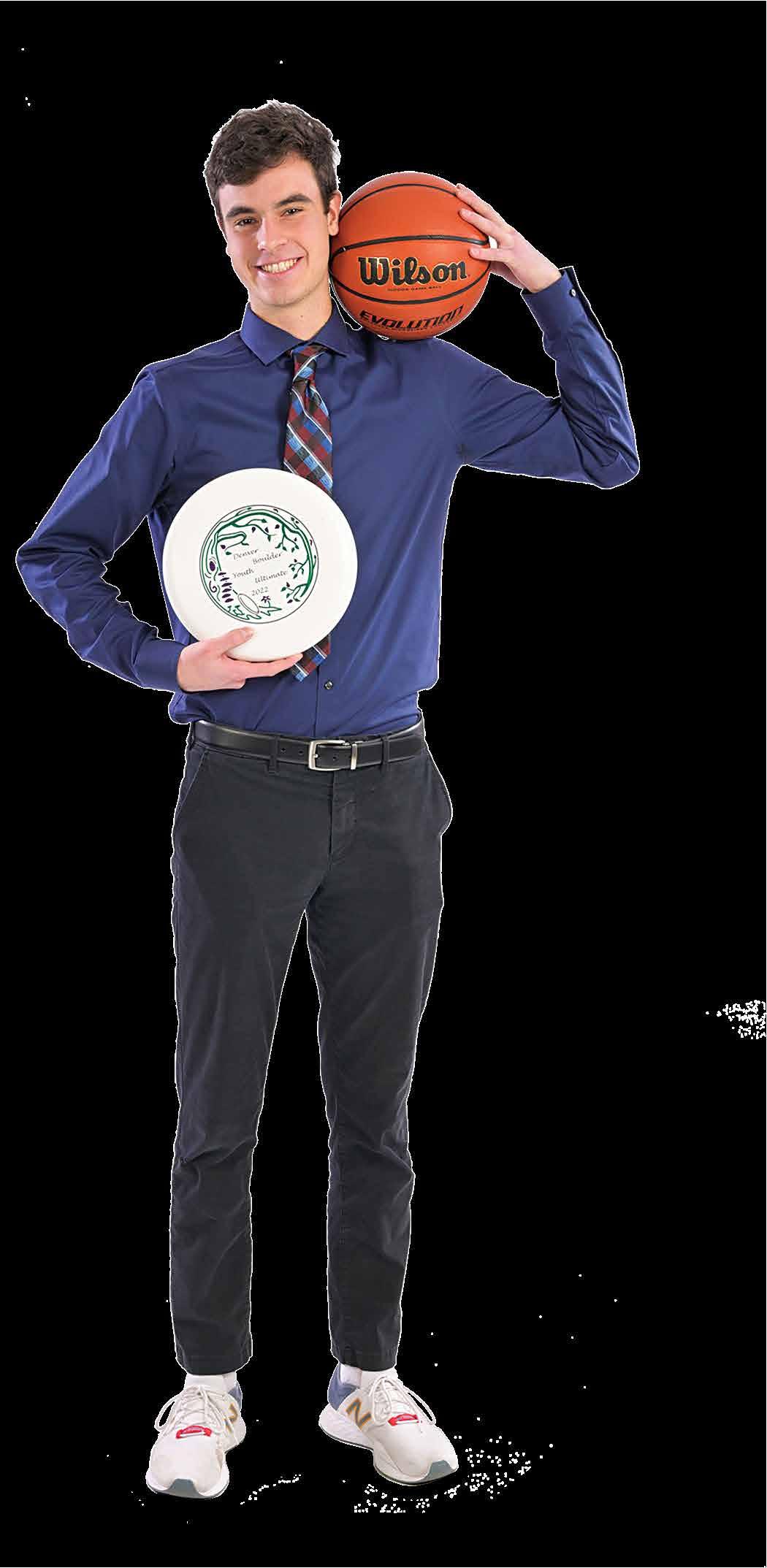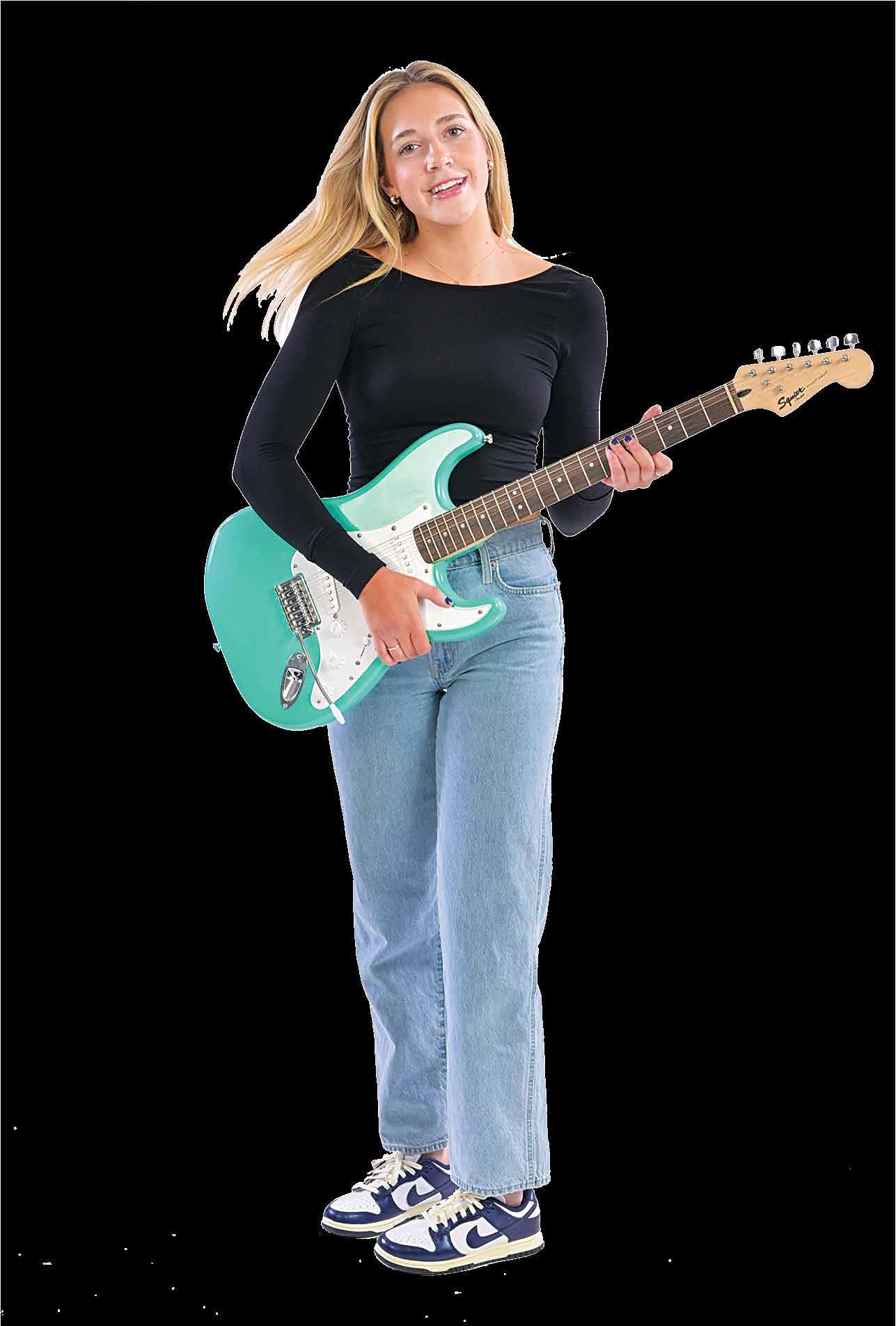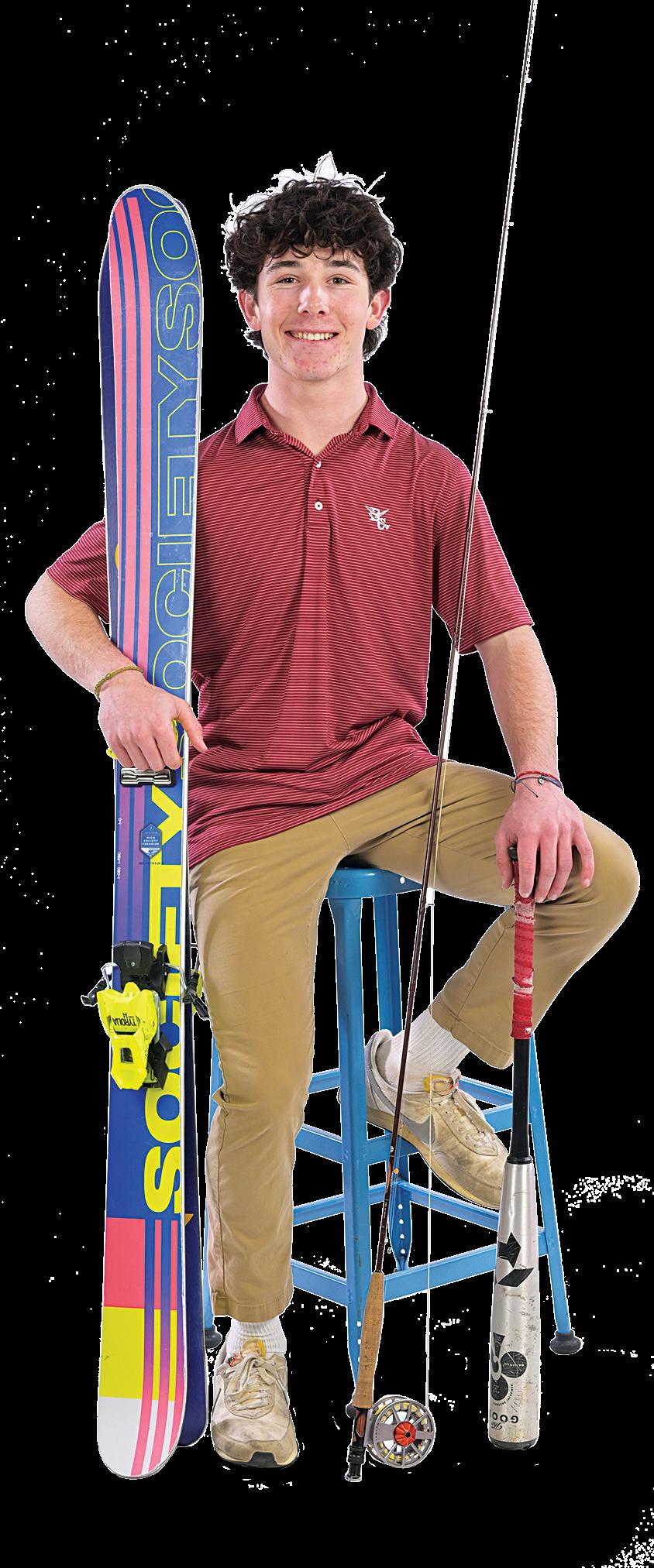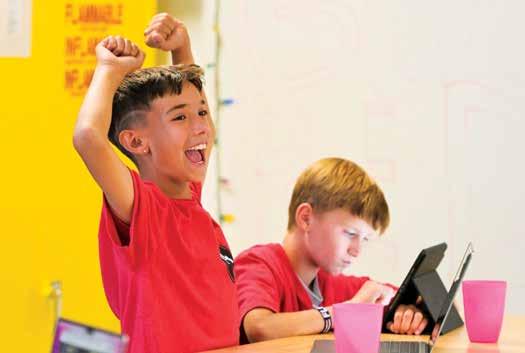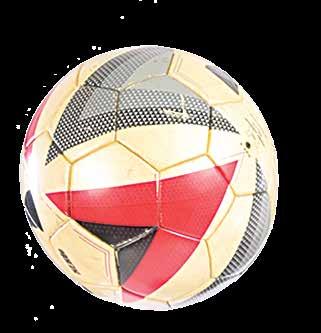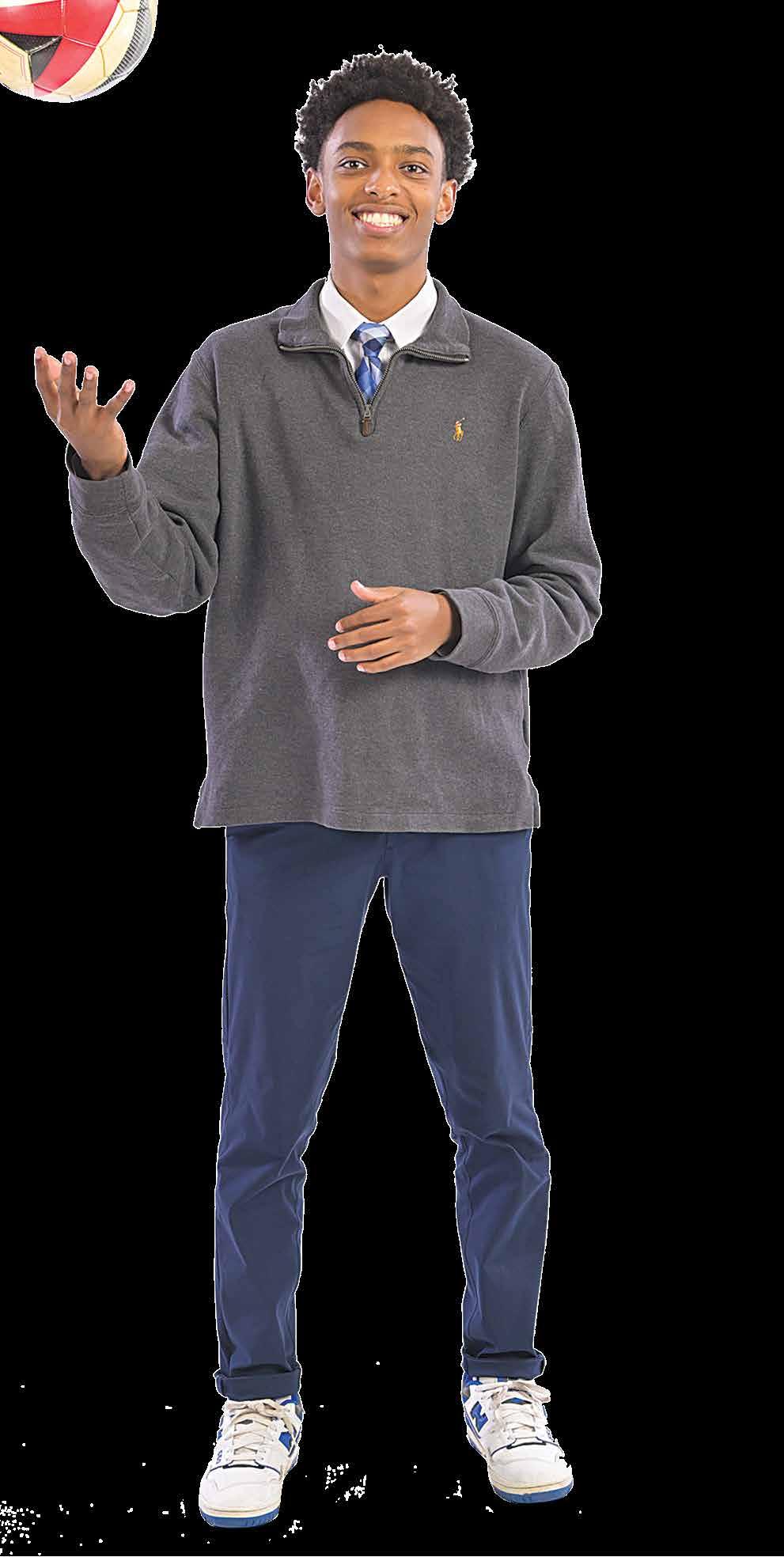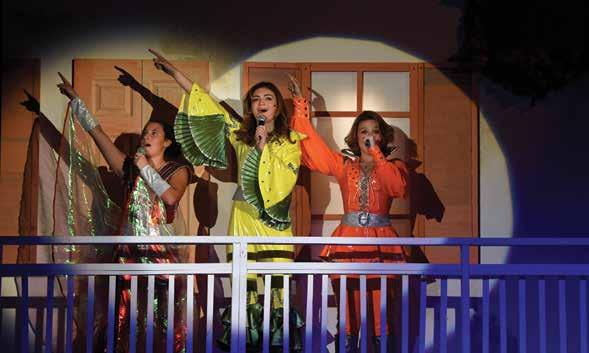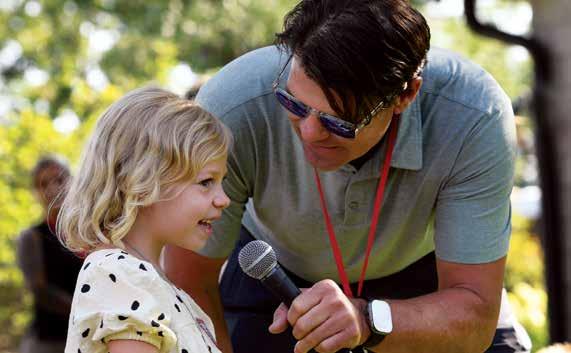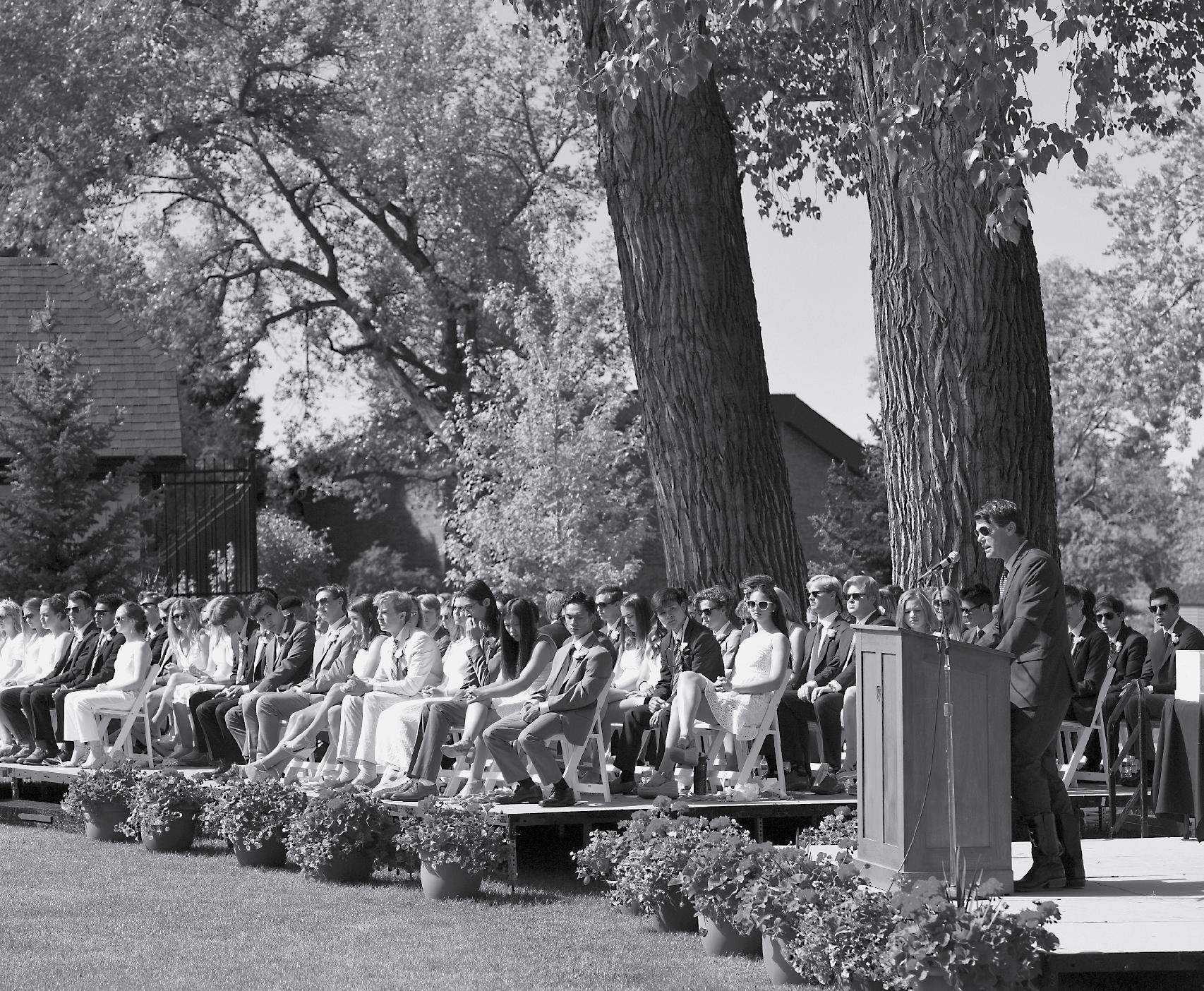



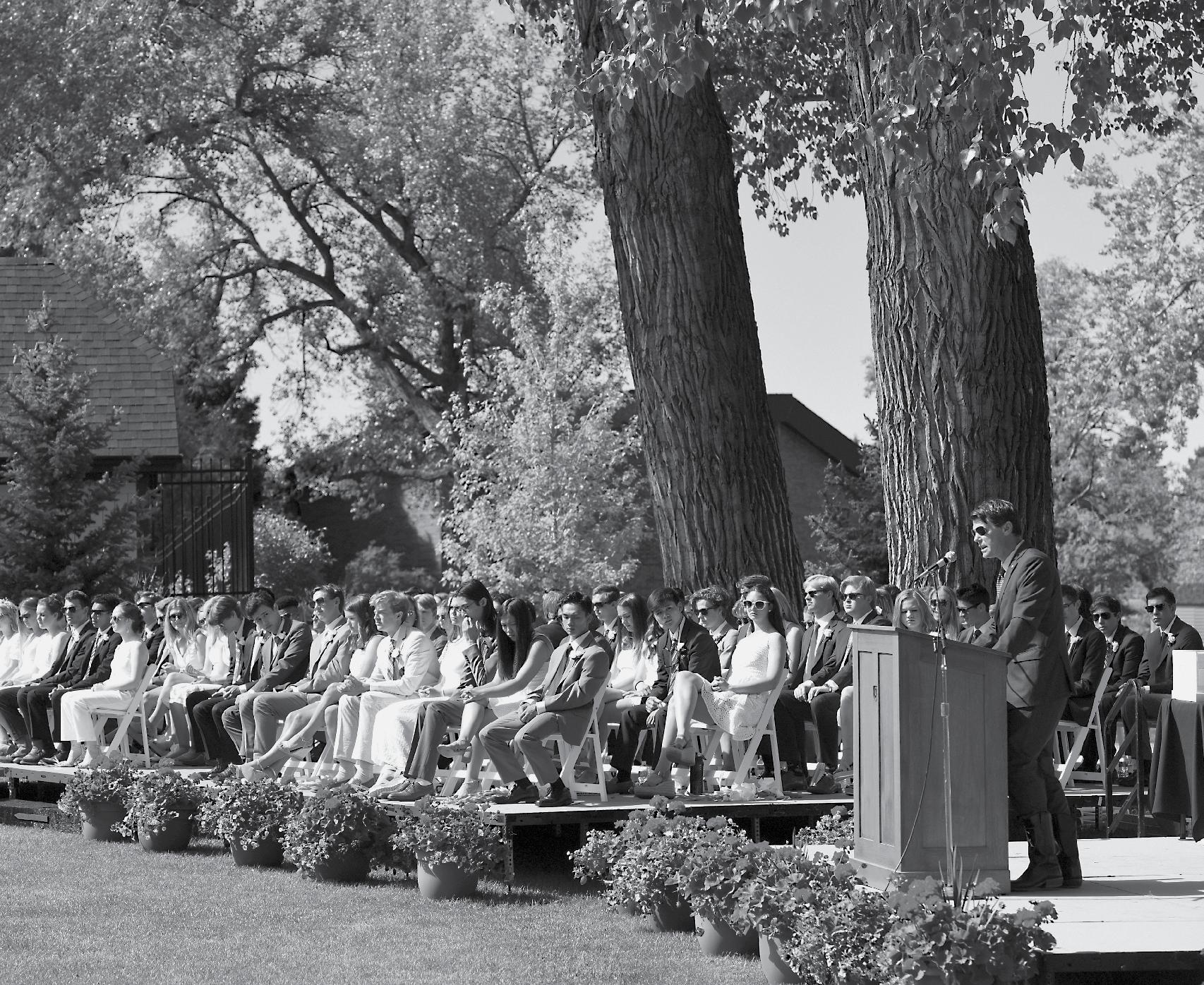
Michael Davis, Ph.D.
Head of School
Amy Wintermeyer
Assistant Head of School
303-914-2526
amy.wintermeyer@coloradoacademy.org
Max Delgado
Upper School Principal
303-914-2520
max.delgado@coloradoacademy.org
Nick Malick
Middle School Principal
303-914-2558
nick.malick@coloradoacademy.org
Angie Crabtree
Lower School Principal
303-914-2554
angie.crabtree@coloradoacademy.org
Jon Hill
Director of Athletics
303-914-2561
jon.hill@coloradoacademy.org
Katy Hills
Director of Visual & Performing Arts
303-914-2574
katy.hills@coloradoacademy.org school mission
Creating curious, kind, courageous, and adventurous learners and leaders. Colorado Academy
3800 South Pierce Street
Denver, Colorado 80235-2404
(303) 914-2513
FAX (303) 914-2589
www.coloradoacademy.org
Founded: 1906
Accreditation
n Association of Colorado Independent Schools
n Pre-Kindergarten and Employee Child Care Centers licensed by the Colorado Department of Human Services
n Member in good standing: National Association of Independent Schools
n Recognized by the Colorado Department of Education, the College Entrance Examination Board, the Colorado High School Activities Association, the Educational Records Bureau, the Association for College Counselors in Independent Schools (Founding School), and the National Association of College Admissions Counselors, complying with the NACAC Statement of Principles of Good Practice.
Grade Levels and Enrollment
LOWER SCHOOL:
Pre-K through Grade 5: 355 students
MIDDLE SCHOOL:
Grade 6 through Grade 8: 233 students
UPPER SCHOOL:
Grade 9 through Grade 12: 445 students
Total: 1,033 students
Tuition
$31,770-$39,190
Upholding the school’s belief that ability to pay
Pupil/Teacher Ratio 8:1
Average class size: 15
Maximum class size: 20
Pre-Kindergarten: 36 students with six full-time teachers and access to specialists in art, Spanish, music, P.E., technology, library, and science one to three times a week.
Kindergarten: Three classrooms of 16 students, each with a homeroom teacher and an assistant teacher. Access to specialists in literacy and math, as well as art, music, P.E., technology, library, science, and Spanish two to four times a week.
First Grade: Three classrooms of 16-17 students, each with a homeroom teacher and access to specialists in literacy and math, as well as art, music, P.E., technology, library, science, and Spanish two to three times a week.
Second-Fifth Grades: Three classrooms of 16-20 students, each with a homeroom teacher and access to specialists in literacy and math, as well as art, music, P.E./kinesiology, technology, library, science, and Spanish two to three times a week.
Middle School: Students cycle through daily classes of math, English, social studies, French or Spanish, arts & engineering electives, science, and athletics. Important social-emotional learning also occurs during dedicated advisory time, class meetings, and MS Town Meetings. Class sizes range from 11 to 19, depending on the hour of the day, with average class size at 15.
Upper School: Students cycle through daily classes of math; English; social studies; French, Spanish, or Mandarin; art electives; science; computer science, engineering & design electives; and athletics. Important socialemotional learning also occurs during dedicated advisory time, class meetings, and Town Halls. Class sizes range from 6 to 20, depending on the hour of the day, with average class size at 15.

Student Profile
CA attracts highly motivated students of above average to exceptional ability seeking academic challenge.
100% of our graduates are accepted to four-year colleges and universities; 153 new students from throughout the metro area, across the country, and internationally began the 20242025 school year.
A diverse student body (racial/ethnic diversity: 33%) comes from 65 ZIP Codes throughout the metropolitan and suburban areas.
Faculty Profile
157 faculty members; 74% of all faculty have advanced degrees; and 92% of Upper School faculty have advanced degrees.
26% of faculty and staff are from diverse racial/ ethnic backgrounds.
Faculty average is 16 years of classroom experience and 11 years at CA.
A full-time faculty member at CA teaches a LS grade-level homeroom or specialty subject area; or, in the Middle and Upper Schools, four sections of their subject area expertise, plus an advisory. Many teachers also coach a sport, lead a schoolsponsored trip, and/or sponsor a student club.
The Campus and Facilities
Colorado Academy, located on a 94-acre campus in southwest Denver, comprises three divisions to meet the developmental and learning needs of its 1,033 students. Each division has its own principal, faculty, dedicated academic building, and science and technology laboratories.
n Environmentally friendly LED lights that create zero light pollution were installed in 2021 on Slater Turf Field; an additional illuminated surface, Newton Turf Field, welcomed athletes in fall 2024.
n The Leach Center for the Performing Arts opened in fall 2021 with a 500-person main stage theater, 90-person black box theater, rehearsal rooms, Speech & Debate center, and outdoor V-lab amphitheater.
n A new Field House was completed in March 2018, followed by the opening of the full Athletic Center in February 2019.
n CA’s Ponzio Arts Center opened in January 2017, providing a creative home to students’ expression in the visual arts.
n The Froelicher Upper School opened in January 2013 and features expanded math and science labs, an Innovation Lab, and collaborative spaces for the humanities.
All divisions share a dining hall, arts and athletic facilities, playing fields, two libraries, and leadingedge technology spaces.
Curriculum
Colorado Academy offers a college preparatory curriculum, emphasizing disciplines in the liberal arts and sciences, while providing opportunity for advanced work in the areas of a student’s interest
and special competence. The school emphasizes 21st century skills, including:
n Critical thinking and problem solving
n Communication
n Collaboration
n Creativity
n Character development
n Cultural humility
Solid core teaching in courses including reading, writing, literature, the sciences, mathematics, global languages, computer science/engineering, and history/civics provides a strong educational foundation. CA strives to develop the whole child through a rich, challenging, and balanced curriculum within a caring, forward-looking community.
Services
Ten CA bus routes serve the Denver metropolitan area; late bus routes run for students in afterschool activities.
Nutritious, well-balanced lunch is included in the price of tuition. Organic, vegetarian, nut-free, and gluten-free options are available.
Before- and after-school care for Lower and Middle School students is offered from 7:30 a.m. to 8:00 a.m. and from 3:20 p.m. to 5:30 p.m. (only until 5:00 p.m. for Pre-K).
CA also offers auxiliary before- and afterschool programming in robotics, theater, choir, chess, and athletics.
Raether Library and computer area are staffed from 7:30 a.m. to 4:30 p.m. on school days (until 4:00 p.m. on Fridays).
A variety of summer programs is available, including day camp, sports camps, travel opportunities, academic enrichment camps, and service options.
Libraries
CA’s two libraries, staffed by teaching librarians, serve grades Pre-K–12, with an average of 38 volumes per student and web-based library catalog with school and home access to print, audio, video, and online resources.
Technology
CA’s 1:1 iPad program extends from Third to Eighth Grade. All students in Grades 3 and 4 have an assigned class iPad for reading, math, and completing assignments with Google tools
and apps such as Book Creator. In Grades 5-8, students use their individual iPads for note-taking, annotating, word processing, research, reading, and taking and editing photos and videos. In addition to their school-provided iPads, MS and US students have access to a broad and varied Computer Science/Engineering & Design curriculum, taught by faculty in the sciences, technology, arts, and humanities. These courses take place in computer science labs, an innovation/design studio, and the Anderson Innovation Lab, which features 3D printers, laser cutters, and other programmable tools.
The school’s Digital Media Center has 32 workstations with a full curriculum in digital photography and video production for Grades 7-12. Schotters Music Center is home to CA’s professional-level sound recording studio. All faculty members have laptops and iPads and employ interactive projectors in their teaching.

Global Studies
International travel and global studies opportunities are available to students. Recent destinations have included Québec, Belize, Costa Rica, Colombia, Peru, Taiwan, Senegal, Cuba, Spain, Greece, and England.
CA offers a Grade 11 student Scottish Exchange Program and a student exchange in Colombia and Spain, and CA faculty and students collaborate with schools in Rwanda and Haiti.
Experiential Education
n Annual Grade 3 trip to the Plains Conservation Center
n Annual Grade 4 mountain hike
n Annual Grade 5 spring overnight Crow Canyon trip
n Grade 7 Advisory Overnight Trip
n Grade 8 Backpacking Trip
n All Middle and Upper School students participate in Interim, a weeklong experiential learning program in the spring trimester. Each Interim trip includes approximately 10-15 students from across grade levels and is led by a CA faculty member.

The program is designed to provide students with challenging experiences, many of them involving outdoor skills, with CA faculty and classmates. Examples of recent Interims include: Canoeing, Rock Climbing, Cross-Country Ski Hut Trip, Mission Wolf, Aerial Acrobatics, Canyoneering, and Woodworking and Design.
CA offers additional optional weekend trips for students from each division, ranging from fly fishing to snowshoeing to bird banding to mountain climbing.
Athletics
Colorado Academy offers some of the best coaches and most competitive interscholastic teams in Colorado 3A, 4A, and 5A competition. Students may participate in a competitive or non-competitive sport.
Physical education is offered in Pre-K through Grade 6 three to five times per weekly schedule rotation; competitive sports (Grades 6–12) include 61 athletic teams.
Three trimesters of daily sports are required in Middle School; two trimesters of daily sports per year are required for Grades 9 and 10; one trimester per year for Grades 11 and 12; 93% of students participate on competitive teams.
CA’s goal is to compete at the highest level possible in each sport and to provide students with the opportunity for growth through individual and team participation, emphasizing
positive group involvement, fun, good sportsmanship, a strong commitment to student effort, and respect for coaches, officials, fellow team members, and opponents.
CA has 16 varsity-level CHSAA team sports available to all interested athletes in Grades 7-12, and has claimed 30 CHSAA State titles, including:
n Boys Golf (’21)
n Boys Tennis (’19)
n Boys Soccer (’98, ’99, ’12, ’13, ’21, ’22, ’23)
n Girls Soccer (’99, ’03, ’14, ’19, ’24)
n Girls Field Hockey (’97, ’12, ’13, ’14, ’15, ’19, ’22, ’23)
n Girls Lacrosse (’00, ’15, ’16, ’17, ’18, ’19, ’21, ’22, ’23, ’24)
n Girls Golf (’07, ’08, ’16, ’17, ’18, ’19)
n Girls Track and Field (’83)
Six athletic fields, two gymnasiums, a field house, a baseball diamond, rock climbing and bouldering center, outdoor swimming pool, strength and conditioning center, cross-country trail, eight tennis courts, two full-time athletic trainers, and a full-time strength and conditioning coach are available.
Non-competitive options include:
n Racquetball
n Rock climbing (competitive in winter, recreational in fall and spring)
n Strength and conditioning
n Yoga
Competitive options are listed on page 8.
Visual and Performing Arts
At CA, the arts are integral to every student’s coursework. From painting and digital photography to videography and sculpting, dance, and dramatic productions, CA’s visual and performing arts program gives students the opportunity to discover, cultivate, and renew their creative interests.
Lower School students have art and music five times per six-day cycle; Middle School students have arts electives five times per six-day cycle. Upper School includes a six-trimester visual and performing arts requirement. There are advanced courses of study in all areas.
Students in the Upper School have many opportunities to participate in plays and musicals,
both on the main stage and in the black box theater; Technical Theater students build sets and program lighting and sound.
Music students may participate in both audition and non-audition singing groups, and individual music lessons are available in Grades K-12 with accompanying recital performances.
Individual music lessons are offered on the following instruments: piano, violin, viola, bass, cello, flute, clarinet, trumpet, trombone, guitar, saxophone, drums, and in music composition. Students enrolled in the individual music lesson program may also participate in chamber ensembles, string/flute orchestras, and the jazz/ rock combo program. Individual voice lessons are offered for Grades 9-12. Students can enroll in Orchestra, a fully accredited and graded course.
Studio art and digital photo/video students may apply for competitive admission into the Portfolio program. Requirements include a portfolio review, six trimesters of coursework, and a selfcurated Senior Portfolio show.
Choral and instrumental music: Students may participate in the individual music lesson program; 11,000+ music lessons are given each year; Grades 4-12 participate in seven choirs.
Performance opportunities for every student who seeks them:
n Multiple recitals and concerts
n Musicals and plays
n Advanced acting classes
n Digital video program
n Technical theater classes
n Black box theater productions
n Production of original student plays
n Music composition program
n Master drawing classes
n Modern dance, ballet, tap, and choreography
n Annual all-school Music Festival
n Student Film Series and Festival
n Annual all-school Art Festival
Service Learning and Leadership
Students engage in multiple service learning projects in each grade in the Lower and
Middle Schools, through their homerooms or advisory groups.
The Multi-Divisional Youth Philanthropy Program is a Middle and Upper School youth-run board that is involved in grant making to non-profit organizations.
Fifth Grade students trained as Mustang Mentors are paired with Pre-K students during Specials once a week.
CA students in Grades 9-12 have the opportunity to intern in the on-campus Horizons academic enrichment program for students from underresourced families.
Middle School leadership opportunities include Student Action Committee, Grade 8 Leadership Team, and Ambassador Program.
Grade 7 and 8 students participate in annual Outdoor Skills, Leadership, and Communication Retreats.
Middle School students also have the opportunity to design student clubs with a faculty sponsor; examples include Forensics, Logic Club, Unicycle, Innovations, Newspaper, and Outdoor Club.
Upper School students serve through oncampus service activities, class-based service trips, and optional weekend events. Juniors conduct a Community Impact Project, which is an individual service project linked to a student’s areas of interest. Upper School students also run the annual HOPE event, which provides food, clothing, holiday gifts, supplies, and immunizations to nearly 2,000 low-income people annually.
Of 25 active clubs in the Upper School, 15 are service-based.
Approximately 22 Seniors selected each year to mentor Ninth Graders participate in the Community Leadership Team.
Advisory System
Each Upper School advisory averages 10-12 students and remains together all four years of Upper School; Middle School advisory groups range from 10-16 and change at each grade level.
Both Middle and Upper School advisories meet
daily, share snacks, information, and insights, and examine character education and social and developmental issues; counselors are on staff for all three school divisions.
Unique Programs
n Pre-K–12 Mustang Assembly program
n Kindergarten-Senior Buddy program
n K–12 Computer Science/Engineering & Design
n Intentional Pre-K–12 character and leadership development programs
n Lower and Middle School ThinkingLAB projects
n Grade 7 “Outside the Box” creativity and problem-solving course
n Grade 9 Global Perspectives course based on Design Thinking
n REDI Lab: a 12-week, self-directed “schoolwithin-a-school” learning experience for Juniors and Seniors in CA’s REDI Lab, based at the Coleman Center in Denver’s Mariposa Arts District. REDI Lab students design highly personalized projects based on their interests and passions.
n Independent study: Students have the opportunity to design and pursue facultyguided independent study, developing deeper understanding in an area of interest, such as neuroscience, postmodernism, and ornithology.
n Capstone projects in each division are designed to demonstrate students’ transfer of learning. Fifth Grade, Eighth Grade, and Twelfth Grade culminate with capstone projects. For Seniors, these projects allow students to spend a portion of their final academic year working on an independent project.
Parent Involvement
Parent Association promotes a high level of family participation in the school community.
n Topical parenting seminars and school-wide speaker series with approximately 15 events annually
n Parent activities including hiking, book club, museum tours, and more
n Formal parent conferences in fall and spring
18% student/teacher ratio
n Average parent participation in The CA Fund: 81% of students receive need-based financial aid
1,033
$5.5 total enrollment
8:1 million financial aid budget

